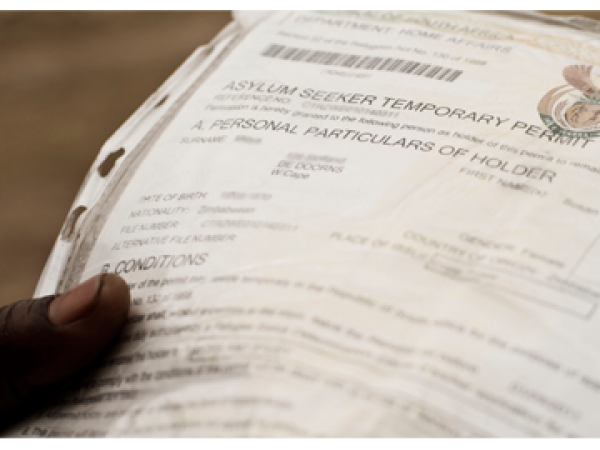
A renewed asylum document sent to Home Affairs for confirmation. Archive photo: Sydelle Willow Smith
3 October 2017
A Zimbabwean man, Tonderai [not his real name], his wife and three children may soon have to leave South Africa. He has lived in South Africa for over 11 years. The Department Home Affairs has given him 30 days to appeal against its decision.
Tonderai left Zimbabwe when he was 23. He applied for asylum in South Africa 2006 and was granted refugee status in 2008, initially for four years.
Tonderai had been active in organising student protests at Midlands State University in Gweru where he was studying management and information systems. He says the Zimbabwean government believes all student protests are linked to the opposition party MDC and he fled.
He renewed his refugee status in 2012 and was given another year, then again in 2013 when he was given four years. Then on 12 September 2017 he went to renew his refugee status. To his shock, he was rejected.
Home Affairs says he travelled to Zimbabwe in 2009, 2010 and 2011. As a result, he invalidated his refugee status. “You re-availed yourself of the protection of the Zimbabwean government by travelling to your country using your [Zimbabwean] passport” the department says in a letter to Tonderai.
But Tonderai says his passport was stolen and he has never returned to Zimbabwe. He says that even when one of his children died in 2008 he did not return home as is the custom, but buried his son at Rusthof Cemetery in Strand. “We stayed here with no family to console us during that difficult time, to avoid breaching our refugee status conditions,” he says.
He says he has an affidavit from his former employer showing he did not take leave and he has bank statements showing he didn’t leave the country.
“I will be arrested the moment I set my foot in Harare. The ruling party is campaigning for upcoming 2018 elections and intimidating protesters. This week, protesters and Daily News reporters were beaten,” he says.
Another Zimbabwean with refugee status is a former MDC chairperson from Zaka West in Masvingo Province, an MDC stronghold. She says that in 2002 ZANU PF youth beat her and burnt her house. She fled the country.
She is worried about her refugee status. When she last renewed her papers she was given only a six-month extension. She has to return to Home Affairs on 22 November.
“When I renewed, the official did not even read my file. He just gave me six months and mentioned that there are no political problems in Zimbabwe,” she says.
“I am worried my refugee status might be rejected. There is no peace in Zimbabwe. If I go back I would be killed,” she says.
Another Zimbabwean who spoke to GroundUp said that after 10 years in South Africa she was rejected in September. She has appealed against the decision. She says, “My parents and siblings fled the country when our home was burned down. They are refugees in the United Kingdom.”
Home Affairs spokesperson David Hlabane said that status is reviewed for all applications, including Zimbabweans. The review is based on whether the reason for granting status still exists or whether the applicant has re-availed him or herself of the protection of his or her country of origin.
“When refugee status is granted it is not indefinite, and periodically the status is reviewed based on the current situation in the person’s country of origin. This is done for all cases and not only for Zimbabweans,” said Hlabane.
According to Aleck Kuhudzai of the Refugee Legal and Advocacy Centre, when refugee status is withdrawn the person has 30 days to leave. They can however still prepare a review application to the High Court.
Tendai Bhiza of PASSOP (People Against Suffering and Oppression) says they currently have 15 rejection and review cases in their database.